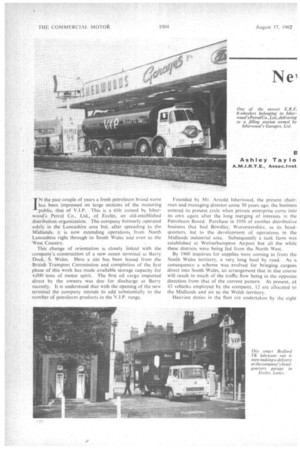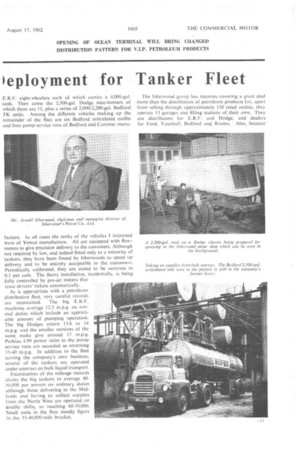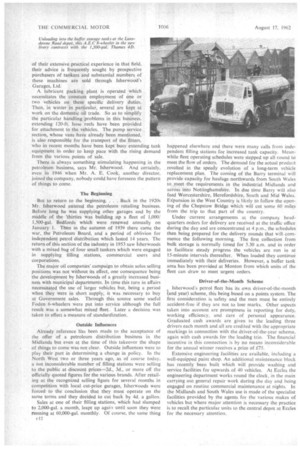Nei
Page 40

Page 41

Page 42

If you've noticed an error in this article please click here to report it so we can fix it.
)eployment for Tanker Fleet
Ashley Tay lo
A.M.1.R.T.E., Assoc.Inst TN the past couple of years a fresh petroleum brand name
has been impressed on large sections Of the motoring public, that of V.I.P. This is a title coined by Isherwood's Petrol Co., Ltd., of Eccles, an old-established distribution organization. The company formerly operated solely in the Lancashire area but, after spreading to the Midlands, it is now extending operations, from North Lancashire right through to South Wales and even to the West Country. .
This change of orientation is closely linked with the company's construction of a new ocean terminal at Barry Dock, S. Wales. Here a site has been leased from the • British Transport Commission and completion of the first phase of this work has made available storage capacity for 4,000 tons of motor spirit. The first oil cargo imported direct by the owners was due for discharge at Barry recently. It is understood that with the opening of the new terminal the company intends to add substantially to the number of petroleum products in the V.I.P. range. Founded by Mr. Arnold Isherwood, the present chairman and managing director some 30 years ago, the business entered its present cycle when private enterprise came into its own again after the long merging of interests in the Petroleum Board. Purchase in 1956 of another distributive business that had Bewdley, Worcestershire, as its headquarters, led to the development of operations in the Midlands industrial area. Subsequently a tank farm was established at Wolverhampton Airport but all the while these districts were being fed front the North West.
By 1960 inquiries for supplies were coming in from the South Wales territory, a very long haul by road. As a consequence a scheme was evolved for bringing cargoes direct into South Wales, an arrangement that in due course will result in much of the traffic flow being in the opposite. direction from that of the current pattern. At present, of 43 vehicles employed by the company, 12 are allocated to the Midlands and six to the Welsh territory.
Heaviest duties in the fleet are undertaken by the eight E.R.F. eight-wheelers each of which carries a 4,000-gal. tank. Then come the 2,500-gal. Dodge nine-tonners of which there are 11, plus a series of 2,000/2,200-gal. Bedford TK units. Among the different vehicles making up the remainder of the fleet are six Bedford articulated outfits and four pump service vans of Bedford and Commer manu
facture. In all cases the tanks of the vehicles I inspected were of Yewco manufacture. All are equipped with flowmeters to give precision delivery to the customers. Although not required by law, and indeed fitted only to a minority of tankers, they have been found by Isherwoods to speed up delivery and to be entirely acceptable to the customers. Periodically calibrated, they are stated to be accurate to 0.1 per cent. The Barry installation, incidentally, is being fully controlled by pre-set meters that issue drivers' tickets automatically.
As is appropriate with a petroleum distribution fleet, very careful records are maintained. The big E.R.F. machines average 12.5 m.p.g. on normal duties which include an appreciable amount of pumping operation. The big Dodges return 13.6 to 14 m.p.g. and the smaller versions of the same make give around 17 m.p.g. Perkins 4.99 power units in the pump service vans are recorded as returning 35-40 m.p.g. In addition to the fleet serving the company's own business; several of the tankers are operated under contract on bulk liquid transport.
Examination of the mileage records shows the big tankers to average 4050,000 per annum on ordinary duties although those delivering in the Midlands and having to collect supplies from the North West are operated on double shifts, so reaching 60-70,000. Small units in the fleet mostly figure in the 35-40,000-mile bracket. The Isherwood group has interests covering a great deal more than the distribution of petroleum products for, apart from selling through approximately 150 retail outlets, they operate 13 garages and filling stations of their own. They are distributors for E.R.F: and Dodge, and dealers for Ford, Vauxhall. Bedford and Rootes. Also, because of their extensive practical experience in that field, their advice is frequently sought by prospective purchasers of tankers and substantial numbers of these Machines are sold through 1sherwood's Garages, Ltd: A lubricant packing plant is operated which necessitates the constant employment of one or two vehicles on these specific delivery duties. Then, in winter in particular, several are kept at work on the domestic oil trade. So as to simplify the particular handling problems in this business, extending 120-ft. hose reels have been provided for attachment to the vehicles. The pump service section, whose vans have already been mentioned, is also responsible for the transport of the fitters, who in recent months have been kept busy extending tank equipment in order to keep pace with the rising demand from the various points of sale.
There is always something stimulating happening in the petroleum business, says Mr. Isherwood. And certainly, even in 1946 when Mr. A. E. Cook, another director, joined the company, nobody could have foreseen the pattern of things to come.
The Beginning But to return to the beginning. . . . Back in the 1920s Mr. Isherwood entered the petroleum retailing' business. Before long he was supplying other garages and by the middle of the 'thirties was building up a fleet of 1,000; 1,500-gal. Bedfords which were renewed annually on January 1. Then in the autumn of 1939 there came the war, the Petroleum Board, and a period of oblivion for independent petrol distribution which lasted 14 years. The return of this section of the industry in 1953 saw Isherwoods with a mixed bag of four small tankers which were engaged in supplying filling stations, commercial users arid corporations.
The major oil companies' campaign to obtain solus selling positions was not without its effect, one consequence being the development by Isherwoods of a greatly increased business with municipal departments. In time this turn in affairs necessitated the use of larger vehicles but, being a period when they were in short supply, it was necessary to buy at Government sales. Through this source some useful Foden 6-wheelers were put into service although the full result was a somewhat mixed fleet. Later a decision was taken to effect a measure of standardization, Outside Influences Already reference has been made to the acceptance of the offer of a petroleum distribution business in the Midlands but even at the time of this takeover the shape of things to come was not clear. Outside influences were to play their part in determining a change in policy. In the North West two or three years ago, as of course today, a not inconsiderable number of filling stations were selling to the public at discount prices-2d., 3d., or more off the officially quoted figures for the various brands. After retailing at the recognized selling figure for several months in competition with local cut-price garages, Isherwoods were forced to the conclusion that they must operate on the same terms and they decided to cut back by 4d. a gallon.
Sales at one of their filling stations, which had slumped to 2,000-gal. a month, leapt up again until soon they were running at 60,000-gal. monthly. Of course, the same thing c 1 ") happened elsewhere and there were many calls from independent filling stations for increased tank capacity. Meanwhile fleet operating schedules were stepped up all round to meet the flow of orders. The demand for the actual prodint resulted in the speedy evolution of a long-term vehicle replacement plan. The coming of the Barry terminal will provide capacity for haulage northwards from South Wales to meet the requirements in the industrial Midlands and across into Nottinghamshire. In due time Barry will also feed Worcestershire, Herefordshire, South and Mid Wales. Eipansion in the West Country is likely to follow the opening of the Chepstow Bridge which will cut some 60 miles from the trip to that part of the country.
Under • current arrangements at the company headquarters orders for delivery are received at the traffic office during the day and are concentrated at 4 p.m., the schedules then being prepared for the delivery rounds that will commence the following morning. The first collection from bulk storage is normally timed for 5.30 a.m. and in order to facilitate steady progress the vehicles are run in at 15-minute intervals thereafter. When loaded they continue immediately with their deliveries. However, a buffer tank area has been provided at Manton from which units of the fleet can draw, to meet urgent orders.
Driver-of-the-Month Scheme
Isherwoods petrol fleet has its own driver-of-the-month land year) scheme, this being based on a points system. The first consideration is safety and the men must be entirely accident-free if they are not to lose marks. Other aspects taken into account are promptness in reporting for duty, working efficiency, and care of personal appearance. Graduated cash awards are given to the leading three drivers each month and all are credited with the appropriate markings in connection with the driver-of-the-year scheme, again with cash awards for the leadifig trio. The financial incentive in this connection is by no means inconsiderable for the annual winner receives a prize of £75.
Extensive engineering facilities are available, including a well-equipped paint shop. An additional maintenance block has recently been built which will provide washing and service facilities for upwards of 40 vehicles. At Eccles the engineering department works round the clock, in the main carrying out general repair work during the day and being engaged on routine commercial maintenance at nights. In the Midlands and South Wales use is made of the specialist facilities provided by the agents for the various makes of vehicles but where major attention is necessary the practice is to recall the particular units to the central depot at Eccles for the necessary attention.












































































































